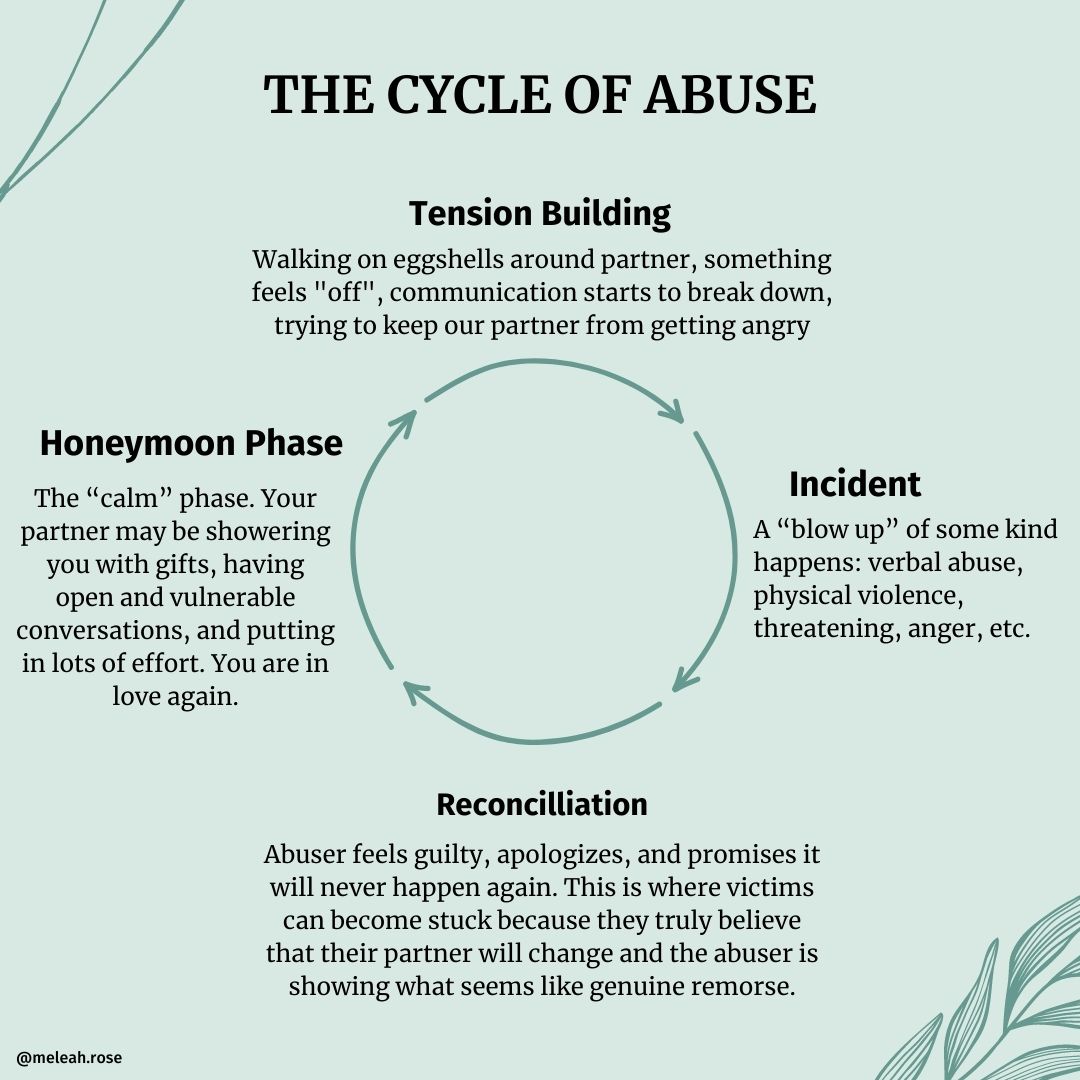21 Signs You're in an Abusive Relationship
Sep 26, 2021
***Trigger Warning: This post may be disturbing or upsetting to some readers. Discretion is advised***
Have you been questioning whether or not you're experiencing abuse in your relationship?
Wondering whether all of these intense emotions you’re experiencing with your partner are normal?
Desperate to find out whether or not it’s all in your head?
First of all, I want you to know that you’re not alone.
If you feel like you need support, call the Domestic Violence Hotline at 800.799.SAFE (7233) to talk to a trusted crisis counselor about what you’re experiencing.
Secondly, if you’re questioning whether or not something is “wrong” in your relationship, I urge you to trust yourself. Our gut never lies.
It can be tricky to recognize when we're in an abusive or toxic relationship. Sometimes we may believe that the signs aren’t “quite there”. And we most likely feel like our partner genuinely loves us.
Here's the thing...
Abuse and unhealthy relationships fall along a spectrum. No two relationships are the same. And no one truly wants to believe that their partner is abusive.
But knowing the signs can save your life. And at the very least, it can save your well-being.
Here are 21 signs that you’re in a toxic and/or abusive relationship:
There are lots of ups and downs
Every relationship has its ups and downs. But healthy relationships are supposed to feel consistent, safe, and stable--with more ups than downs. If your relationship feels like a rollercoaster, you may be in an abusive relationship. And this may be explained by the cycle of abuse.
You’re in the cycle of abuse
This theory, otherwise known as ‘the cycle of violence’, looks at the 4 different stages of an abusive relationship that vacillate back and forth between love and violence.
Keep in mind that ‘violence’ can refer to physical violence as well as emotional, verbal, psychological, financial, spiritual, and sexual.
Here's how it works:
Stage 1: Tensions building:
This is the stage where we feel like we have to walk on eggshells around our partner. Things get rocky and we start to notice that something is off. Communication starts to break down and we try to keep our partner happy to avoid an argument.
Stage 2: Incident:
A “blow up” happens which typically includes things like fighting, physical violence, threatening, anger, etc.
Stage 3: Reconciliation:
The abuser feels guilty, apologizes, and asks for you to take them back. This is where victims can become stuck because they truly believe that their partner will change and the abuser is showing what seems like genuine remorse.
Stage 4: Honeymoon phase:
Otherwise known as the “calm” phase where things are great in your relationship again. Your partner may be showering you with gifts, having open and vulnerable conversations, and putting in lots of effort to show you that they care. You truly believe that they will never do anything to hurt you like that again.

Unhealthy communication
Mutual respect and care is foundational for healthy communication. If you feel like you’re having frequent arguments with your partner, check in with yourself and see whether any of these things are happening:
- Name-calling
- Screaming
- Breaking things
- Throwing things
- Being condescending (hurtfully sarcastic)
- Threatening to hurt you or dump you during arguments
- Threatening that they will hurt/kill themselves
Love-bombing at the beginning of the relationship
Healthy relationships are consistent, stable, and take time to build. If you start dating someone who instantly makes you feel like you’re the person they’re going to marry, be very wary. Watch out for people who idealize a future with you before they truly know who you are (and before you truly know them). This is a form of manipulation that boosts up your ego and makes you fall in love with them before you truly get to know them--making it easier for toxic behaviors to be overlooked later.
- Excessive gift-giving at the beginning of the relationship
- Rushing into exclusivity early in the relationship
- Spoils you rotten, but you feel like you owe them something in return
- They don’t stop complimenting you
- They make you seem like you’re perfect and put you on a pedestal
Jealousy and Possessiveness
While a little jealousy once in a while is normal in a relationship, excessive jealousy is not. Watch out for partners who make you constantly feel like you’re doing something wrong and make it seem like they can’t trust you.
- Frequently accuse you of cheating
- Constantly checking in on you
- Keeping tabs on you and your friends
- Questioning just about every friendship you have
- Following you around
- Getting upset when you make plans without them
- Showing up uninvited/unannounced to your outing with friends
Loss of relationships with friends and family
Since you and your partner got together, your outside relationships with friends and family members have slowly gotten worse. This can happen when our partner isolates us from the people we love (for ex, telling us that they don’t want us hanging around certain people anymore). And it can also happen when we get so tired of dodging questions about the relationship that we slowly distance ourselves from people who may ask about how we’re doing.

Roles of inferiority & superiority
Abusers like to believe (and act) like they’re better than you. Firstly, this isn’t true. All people are equal in a relationship. If your partner frequently acts like they’re superior, this is a problem.
- Treats you like you’re dumb or hopeless
- Uses harsh sarcasm to “poke fun” at you
- Makes belittling comments about your personality or appearance
- Acts as if they’re right all the time
- Treats you as if you’re inferior to them
Gaslighting
Gaslighting is a form of manipulation that makes you question your reality. You may be being gaslighted if you’re being worn down and feel like you’re “crazy” in the relationship. Gaslighting may be happening in your relationship if:
- You feel like you’re constantly questioning your reality
- Your partner constantly denies their inappropriate/toxic behavior
- Your partner tells you that you said/did something... but you can’t remember saying/doing it
- You’re convinced that everything you do is wrong
- You feel like (more often than not) you're in a lose-lose situation with your partner
- Your feelings are frequently being minimized and used against you
- Your partner tells you one thing and consistently does another
- You have to apologize for things you didn’t do
Controlling behaviors
Abusers strive to have complete power and control in a relationship. And abusive partners do anything they can to get their own needs met, regardless of the expense to you. You may have a controlling partner if they are:
- Chronically criticizing you for things
- Demanding you share your texts and emails with them
- Putting conditions on the love they give you (“I’d love you more if you put in more effort around the house.”)
- Telling you to change your physical appearance
- Refusing to accept any blame or fault in the relationship
Dishonesty
Dishonesty in relationships ranges from mild to severe. Healthy relationships are built on trust and honesty. If you’re noticing frequent holes in your partner’s stories, or you feel like you’re constantly questioning whether they’re being fully honest with you, trust your gut. It’s usually never wrong. Signs of dishonesty may include:
- They frequently change their story
- Small details are exaggerated
- They’re not honest with you about how they spend their time
- They’re not honest about who they spend time with
- You constantly feel like their stories don’t add up
- Something just feels “off” a lot of the time

You find yourself wishing things would change
If you find yourself wishing that things in your relationship were different, it’s a sign you’re not in the right relationship. If you’re wishing that your partner would treat you better and be kinder, then you’re definitely not in the right relationship. But it can be hard when we love someone to take their actions for face value. You may be with an abusive partner if you’re:
- Making excuses for your partner
- Believing that they will change once you work hard enough at the relationship
- Questioning whether the relationship is “worth it”
- Justifying their behaviors
- Walking on eggshells so that things don’t get messy again
- Withholding information about your relationship from friends and family members
- Afraid to tell others about what’s going on in your relationship
Unwanted sexual activity
Just because you are in an intimate relationship with someone does not mean that your partner has 24/7 access to you and your body. Sexual abuse can look different in every abusive relationship. It may be aggressive and forced, or it may be subtle and covert. Here are some of the ways someone may be using sexual activity as a form of power and control in your relationship:
- Forces you to have sexual intercourse when you don’t want to
- Makes you feel disgusting in the bedroom
- Guilt trips you into having sex with them
- Forcing you to dress in a sexual way
- Demanding sex even when injured, sick, tired, or upset
- Making demeaning comments about your body that make you uncomfortable
- Disrespecting your boundaries
Physical violence (or threats of violence)
Just like sexual aggression, physical aggression can range from mild to severe. Just remember that if your partner is being physical with you in any way that hurts or makes you feel uncomfortable (without your consent), it is abusive. Examples may include:
- Hitting/punching
- Slapping
- Biting
- Burning
- Body slamming
- Shoving you into a wall
- Pinching
- Choking
- Tickling (as a form of control)
- Blocking you from leaving
- Grabbing you
- Pulling your hair
- Imitations of hitting you (punching their own palm very closely to your face)
Manipulation
While manipulation can happen in any relationship, it’s a common occurrence in unhealthy intimate relationships. Manipulation is an abusive tool that one uses to get what they want from another person or from a relationship This may look like:
- Apologizing for their behavior but doesn’t actually change
- Using intense emotional connection to keep you from leaving
- Using guilt trips or shame to get what they want
- Giving you the silent treatment instead of communicating with you
- Making you doubt yourself
- Frequently lying and being dishonest
- Making you feel like you’re constantly to blame
- Withholds things (love, sex, money, etc.) from you as punishment
Disrespecting your privacy
Just because you’re in a relationship does not mean that your partner gets full access to you and your private life. You have a right to complete privacy around things like your phone, passwords, social media, etc. Your partner is disrespecting your privacy if they are:
- Snooping through your personal belongings
- Going through your phone without permission
- Breaking into your social media accounts
- Hacking into your emails
- Monitoring your internet usage
- Accessing your phone records
- Tracking your car
- Eavesdropping on private conversations

You feel constantly stressed and drained
Healthy relationships should make you feel at ease and cared for more often than not. If you’re experiencing a relationship where you’re feeling exhausted and worn out, you’re not with the right person. Especially if you’re feeling stressed and drained from the amount of arguments you are constantly having.
All take, no give
You feel like you’re the only one in the relationship who is trying to make things work. No matter how much you give, you feel like you don’t get much back in return. And you’re starting to feel pretty worn out from it.
- You feel “expected” to do things for your partner
- You’re met with anger or the silent treatment when things aren’t done the way your partner expects
- Your partner makes your feel guilty if you ask them for anything
- You feel like you’re running out of steam
- You’re feeling resentful of how much you give to your partner
- Things don’t feel equal in the relationship
- You feel unappreciated by your partner
You’re making excuses for their bad behavior
Your friends and family have all come to you to tell you they’re concerned about your partner’s behavior. But you find yourself making excuses for your partner over and over again. More often than not, you blame his bad attitude on something you did, or the fact that he’s been extra stressed at work recently.
Finances are being controlled
Financial abuse is a thing. And it’s very common in unhealthy and/or abusive relationships. Taking charge of someone’s money is the ultimate way to have control and power over them. It can refrain them from having a life of their own and restricts access to basic needs. Your partner may be financially abusing you if they:
- Feel entitled to your money and belongings
- Does not allow you to get your own job, advance your career, or pursue higher education
- Limit access to your bank account or funds
- Maxes out credit cards in your name (and refuses to pay it back)
- Loses their temper when they get angry over your spending habits
- Lives with you without paying bills & refusing to help out around the house
You can’t break up with them
Abusive relationships are hard to leave. And a huge reason for this is because abusive partners don’t typically let you leave. If you’ve tried to break up with your partner, but you can’t, there’s a violation of boundaries happening here. And the person may keep you from leaving by either using emotional or physical tactics. Here are some ways this may show up:
- Apologizing and begging you to stay
- Guilt tripping you and crying
- Threatening to end their life if you leave
- Threatening you with emotional blackmail
- Showing up at your house after you leave them
- Blowing up your phone with calls and texts to get you back
- Blocking the exit or locking you inside/outside of the house
- Physically taking/hiding your keys so you can't leave

You're afraid of what might happen if you leave
Healthy partners understand and respect that you're free to leave the relationship for whatever reason you believe is necessary. If you fear that your partner is going to physically, emotionally, or sexually hurt you by leaving them, you're in an abusive relationship.
If this is you, there are options for you.
What to do if you believe you’re experiencing abuse
1. If you’re in an abusive relationship, please know that it’s not your fault. You deserve love, respect, and honesty in your relationships. And what you're experiencing now isn't love.
2. Your safety should be your #1 priority. If you don’t believe you’re safe, call 911.
3. Find support. There are people out there who care about you and who want to see you in a supportive, loving relationship. I recommend finding a therapist or reaching out to a domestic violence shelter in your area to discuss your options.
National Domestic Violence Hotline: 800.799.SAFE (7233)
4. I believe you. Find others who will listen and support you through this.
5. Remember that you deserve better and there is hope for the future.
As a Trauma-Informed Life & Relationships Coach, I help women with past trauma have healthy, safe, & empowering intimate relationships so that women like you you never have to experience an abusive or toxic relationship ever again.
Please reach out to me on Instagram if there's anything I can help you with and if you're looking for more support. I'm here for you.
You’re brave. You deserve better. And you’re not alone.
Want to create healthy, safe, & loving intimate relationships after trauma?
Let's chat!
Take this Trauma-Informed Relationship Assessment!
Download the FREE Trauma-Informed Relationships Assessment to discover the 5 different areas that past trauma has impacted your intimate relationships.
We hate SPAM. We will never sell your information, for any reason.
